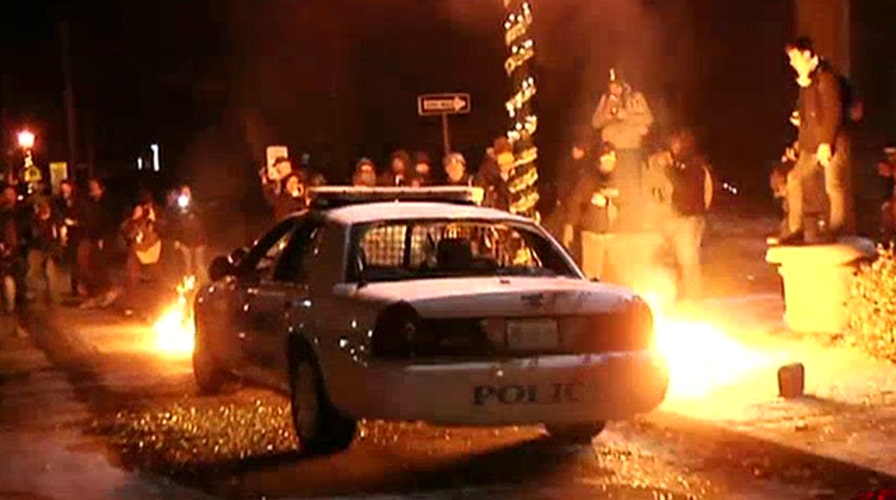Rioters torch cop car; 44 arrested overnight in Ferguson
Adam Housley reports on second night of violence in Ferguson
In August 2011, Police in London shot and killed an armed criminal, Mark Duggan. Playing off assumptions that Duggan, a black man, had been killed by a trigger happy white police officer, five days of rioting followed.
How London’s police dealt with those riots carries four lessons for Ferguson.
1. Rioters shouldn’t be treated as protesters.
When you burn a businesses, or loot a store, or throw rocks at police officers, you’re not a protester, you’re a criminal. Period. End of story. It’s simple delusion to regard what’s happening in Ferguson as political expression. Here, the London riots offer their first lesson.
For the first few days of the London riots, the Police treated the spreading disorder as political expression. They believed that a conciliatory policing response would encourage the rioters to dissipate. In fact, the opposite occurred. The riots grew in size and scale and the violence spread.
[pullquote]
By the fourth day, however, London’s Police employed a different strategy. First, they mobilized thousands of extra police officers. Each morning, they raided the homes of rioters and arrested them as they were sleeping. At night, they held ground and made arrests. By the sixth day, the riots had been stamped out.
Correspondingly, while police in Ferguson must protect the rights of peaceful protesters and balance proportionality in escalation, the rioters must be confronted robustly.
Those attacking Ferguson are not heirs to Martin Luther King. Instead, they’re thuggish criminals. They must be arrested and prosecuted as such.
2. Intelligence is indispensable.
Facing riots, it’s not enough to mobilize a large police force. To complement that effort, the police must make use of a comprehensive intelligence apparatus that can identify and locate riot leaders.
In London, this approach – via reliance on CCTV cameras, route tracking and phone monitoring – enabled the Police to seize the initiative. By taking instigators of violence off the streets, the riots lost their energy. Police in Ferguson must use intelligence assets to identify and detain gang leaders.
3. Responsible leaders must take charge.
In London, the British government took far too long to take charge of the situation. In the absence of resolute leadership, the riots grew and the public was left in fear. But there’s another problem with absent leadership: it encourages faux-leaders to enter the vacuum. Failing to unequivocally condemn the riots in Ferguson, the public discourse is presently dominated by self-aggrandizing clowns like Al Sharpton.
Indeed, just listen to what one Missouri State Senator said Monday night: “This is our race war...”
This insipid mystique of faux-revolutionary politics demands answer. Where leaders allow inflammatory rhetoric to spread without rebuttal, the store burners are fueled to believe that their mayhem has justifying moral purpose.
4. Police must engage creatively with angry, but law-abiding members of the public.
Since the 2011 riots, London Police have made a greater effort to foster community relations with minority communities. This effort has involved a recruitment drive for more minority officers. And while it’s in the early stages, the campaign is bearing hopeful results.
A similar outreach campaign is needed in Ferguson (and in many other cities across America). After all, whatever the causes of mistrust, absent trust between government and the people, social bonds fracture.
Still, simple reforms can help. Modern technology, for example, can play an important role here. For one, body cameras have shown especially encouraging results; increasing public faith in police forces and reducing public complaints.
Moreover, the ability to provide contextually situated, forensic evidence of police-public interactions is priceless. Consider what a body camera might have offered in regards to Darren Wilson’s shooting of Michael Brown.
The Ferguson riots are not the London riots. Nevertheless, there are common themes between these two situations. Grappling with the present unrest, Ferguson officials would gain much by paying heed to London’s experience.

